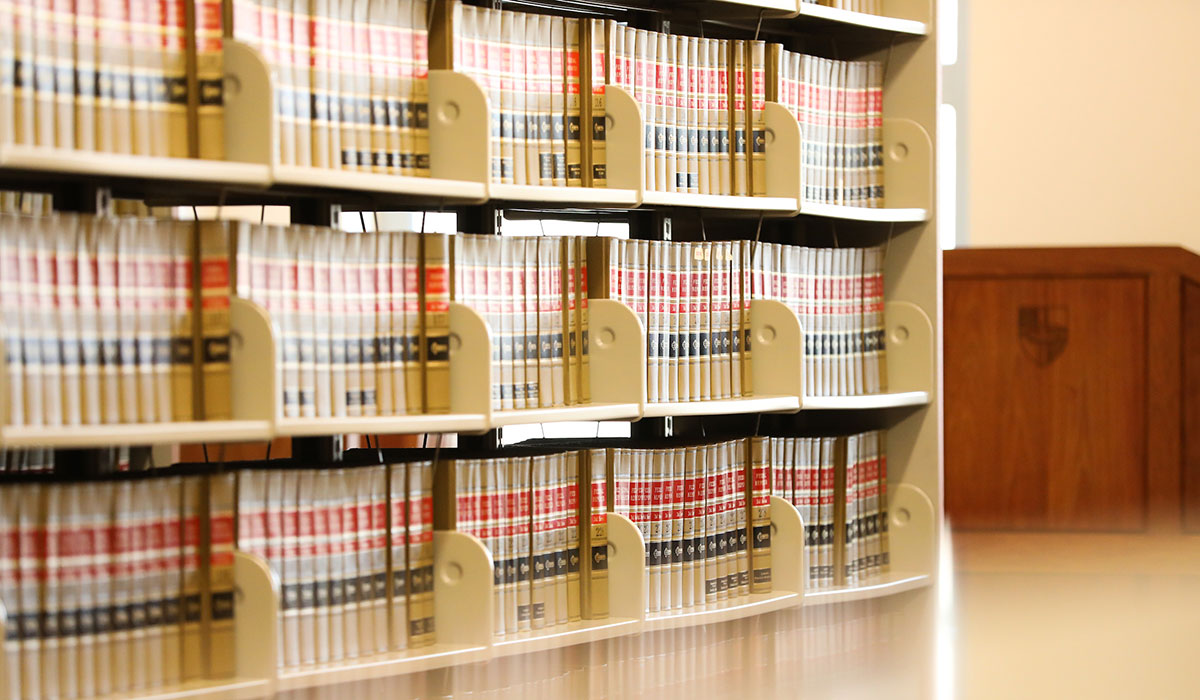
A specialization in Law Librarianship is the gateway to a wide variety of interesting, exciting, and challenging professional opportunities. Some law librarians work in fast-paced law firms, ensuring that attorneys have all the relevant legal and business information bearing on high-stakes cases they're litigating. Others work in federal, state, and local courts, providing judges and their clerks with the background information they need to administer justice in the traditions of our nation. Others find their professional home in academe, taking on the responsibility for the organization and operation of libraries serving professors and law students as they research, study, and write about the law. There are also public service options like public law libraries and prison libraries, where law librarians provide services to help their constituents locate legal information. No matter which path they choose, law librarians share in a stimulating and rewarding profession.
At the Catholic University of America, our Law librarianship program combines an emphasis on legal information sources and services and law library management with a general preparation for professional librarianship. Each student will take the four required core courses in the Master's degree program, required courses for the Law Librarianship specialization, and other appropriate mid-level and advanced courses. It is also strongly recommended that the student obtain professional-level experience through a combination of regular employment, internships, or a practicum. The student will consult with the law librarianship advisor to plan a course of study that will best meet the student's personal and professional needs.
Required core courses for all students are:
- LSC 551 Organization of Information
- LSC 553 Information Sources and Services
- LSC 555 Information Systems in Libraries and Information Centers
- LSC 557 The Information Professions in Society
Required specialty courses for law librarianship are:
- LSC 830: Legal Research (unless waived)
- LSC 839: Advanced Legal Research
- LSC 886: Law Librarianship
Recommended specialty courses for law librarianship are:
- LSC 637: Government Data and Information
- LSC 672: Management
- LSC 695: Practicum
In addition to the required core and specialized courses in Law Librarianship, other mid-level and advanced courses of particular importance include:
- LSC 524: Actionable Intelligence
- LSC 527: Introduction to Data Science
- LSC 615: Metadata
- LSC 633: Information Retrieval and Analysis Strategies
- LSC 635: Human Information Behavior
- LSC 650: Information Architecture and Web Design
- LSC 675: Research Methods in Library and Information Science
- LSC 884: Copyright and Licensing Institute
- LSC 895: Independent Study
|
|
Information Organization |
Resources/ Services |
Information Technology |
Professional Identity/Management |
|
Required Courses |
551 |
553 |
555 |
557 |
|
Required Specialty Courses |
|
830 839 |
|
886 |
|
Recommended Specialty Courses |
637 |
|
672 |
|
|
Electives |
615 |
633 635 884 |
650 |
675 |
Note: LSC 695 Practicum and LSC 895 Independent Study are not included on the table.
Law Librarianship course of study checklist-Apr. 2020 (.docx)
Law Librarianship Informational Flyer (.pdf)
Joint J.D. (Law) - M.S.L.I.S. Program:
Some law librarians hold degrees in both Law and Library Science. While not necessary for many positions in law libraries, a law degree is frequently required for management positions in academic and research institutions. To support students interested in combining the two disciplines, Library and Information Science and the Columbus School of Law offer a joint-degree program to provide academic preparation for law librarianship. The total number of library and information science semester hours of graduate credit required is reduced to 27, and a student in the program may apply up to 12 library science credits toward the J.D. degree.
Notes for Students With a J.D. or Other Advanced Degree
Previous Graduate Degree Exemption
A student who holds one or more accredited graduate degrees when admitted to the program will be automatically exempt from six semester credit hours; however, all remaining credits must be earned within Library and Information Science. To request this exemption, an official transcript of the graduate degree must be submitted at the time application is made.
Exemption from LSC 830, Legal Research, for Students with the J.D.
Students with the J.D. degree, who have taken a course in legal research, may petition to enroll in LSC 839, Advanced Legal Research, without taking the prerequisite LSC 830, Legal Research.
Associations of interest to students in law librarianship
Professional associations for law librarians are important sources of information about the profession, continuing education opportunities, scholarship support, and networking. Most have student membership rates. For further information contact:
American Association of Law Libraries (AALL)
53 W. Jackson, Suite 940
Chicago, IL 60604
Phone: 312-939-4764
Fax: 312-431-1097
http://www.aall.org
Virginia Association of Law Libraries (VALL)
P.O. Box 1378
Richmond, VA 23218
http://vall.pbworks.com
Law Librarians' Society of Washington, D.C. (LLSDC)
PO Box 14306
Washington, DC 20044
http://www.llsdc.org
Special Libraries Association
331 South Patrick Street
Alexandria, VA 22314-3501
http://www.sla.org
